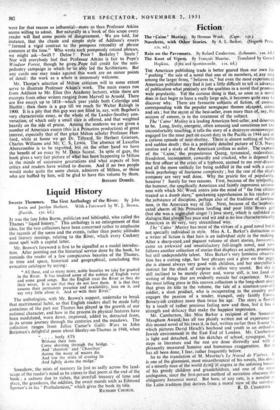Fiction
The 'Caine' Mutiny. By Herman Wouk. (Cape/ Ica.)
Rain on the Pavements. ByRoland. Camberton. (Lehmann. cos. 6d.) THE American publishing trade is better geared than our own for " pushing " the sale of a novel that one of its members, at. any rate among the larger firms, " believes in," but even the most experienced American publisher may find it just a little difficult to tell in' advance of publication what-precisely are the qualities in a novel that promise wide popularity. Yet the curious thing is that, so soon as a novel does in fact begin to haye a really large sale, it becomes quite easy to discover why. There-are favourite subjects of fiction, of course, corresponding with the popular newspaper themes ofspOrt, crime and sex ; but the secret of the best-seller, even more than of, say, the success of esteem, is in the treatment of the subject. The' Caine' Mutiny is a leading American best-seller, and deserves to be. Long, lively, energetic, often amusing and sometimes:not too uncomfortably touching, it tells the story of a destroyer-minesweeper engaged for the most part on escort duty in the Pacific in 1944 and of a curious episode of near-mutiny. There is almost nothing of battle and sudden death ; this is a profusely detailed picture of U.S. Navy routine and a study of the American civilian as sailor. TIN captain of the ' Caine,' the preposterous Queeg, tyrannical, malevolent, fraudulent, incompetent, cowardly and cracked, who is deposed by the first officer-at the crisis of a-typhoon, seemed to me over-drawn and all the more unlikely for being saddled in the end with- a case- book psychology of fearsome complexity ; but the rest of Abe ship's company are very well done. Why the prairie fire of popularity, however ? Surely for two reasons. First, because of the symPathy, the humour, the specifically American and faintly ingenuous serious- ness with which Mr. Wouk enters into the mind of " the free citizen treated as a dumb slave," quickening apprehension in his readers of the _substance of discipline, perhaps also of the tradition oflawless- ness, in the American way of life. Next, because of thesophisti- cated charm of his Princeton lordling and poor little Bronx girl (but she was a ni&-club singer !) love story, which is unfolded in dialoguethit alwajithas pace and wit and is no less characteristically American in it, =very, very streamlined way. - The ' Caine' Mutiny has most of the virtues of a good novel but is not specially individual in style. Miss A. L. Barker's distinction as a writer of fiction is that hers is an individual style in the making. After a sharp-eyed,and piquant volume of short stories, Innocents, .came an awkward and unsatisfactory full-length novel, and now follows another collection of stories that displays an acute, promising but still undependable talent. Miss Barker's very feminine observa- tion has a cutting edge, her best phrases cast a glow on the page, she is almost always very good with children, and her storyteller's instinct for the shock of surprise is often very sound. But she is still inclined to be merely clever and, worse still, is too fond of writing of things that are evidently outside hei experience. Much the most telling piece in this uneven collection is the long-short story that gives its title to the volume, the tale' of a nineteen-year-old soldier, a slum product, who is recuperating in the country and engages the passion of a tender, tranquil, only faintly Emmi Bovary-ish creature more than twice his age. The story is flawed by a touch of rather precious feeling now and then, but it has a strength and delicacy that make the happiest impression. Mr. Camberton, like Miss Barker a recipient of -the Somerset Maugham Award; has all too plainly written out of experience in this second novel of his (was it, in fact, written earlier than Scamp?), which pictures David Hirsch's boyhood and youth in an orthodox Jewish environment in the East End of London. Mr. Camberton is light and detached, and his sketches of school, synagogue, first steps in literature and the rest are done shrewdly and with a pleasantly measured humour and humorous exaggeration, But it has all been done, I fear, rather frequently before. So to the translation of M. Mauriac's Le Noeud de Viperes. It is one of the gloomiest, most misanthropical of his novels, this story of a miserly man of the world dyirfrif angina in the unloving bosom of his greedy children and grandchildren, and one of the most ambiguous, since the first-person method of narration obscures the obligatory Jansenist moral. But here, at any rate, is a novelist in the Latin tradition that derives from a moral view of the universe.
R. D. _CHARQUES.


































 Previous page
Previous page